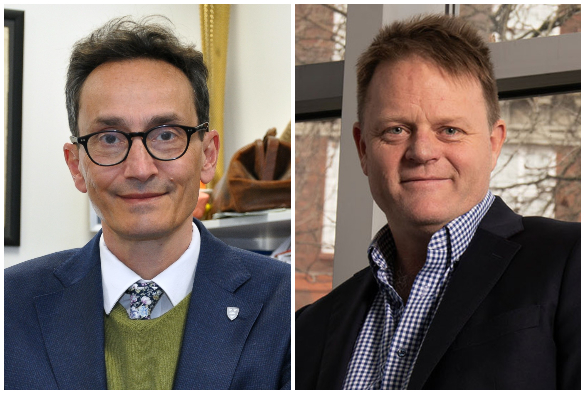Liverpool professors recognised in Queen’s Birthday Honours

Two leading academics from the University of Liverpool have been recognised in the Queen’s Birthday Honours list for their services to research and the COVID-19 response.
Professor Tom Solomon, Director of the National Institute for Health Research (NIHR) Health Protection Research Unit in Emerging and Zoonotic Infections, has been honoured with a CBE and Professor William Hope, Director of the Centre of Excellence in Infectious Diseases Research, has received an OBE. As well as being eminent researchers in their own specialist fields, both have played pivotal roles in leading Liverpool’s response to the COVID-19 pandemic.
Professor Dame Janet Beer, Vice-Chancellor of the University of Liverpool, said: “Professor William Hope and Professor Tom Solomon have both been awarded national honours in recognition of the service they have given as outstanding researchers and educators, and as leaders in their respective fields. The entire University of Liverpool community joins me in congratulating them on their honours - we are very proud to call them our own.”
Professor Tom Solomon CBE
Professor Solomon’s CBE is in recognition of his services to neurological and emerging infections research, including during the COVID-19 response.
After joining the University in 1998 from the University of Oxford, Professor Solomon established the multi-disciplinary Liverpool Brain Infections Group and was appointed Chair of Neurological Science in 2007. He is also an Associate Pro-Vice-Chancellor in the University’s Faculty of Health and Life Sciences and an honorary consultant neurologist at the Walton Centre NHS Foundation Trust and Liverpool University Hospitals NHS Foundation Trust.
Internationally renowned for his expertise in encephalitis (inflammation and swelling of the brain), Professor Solomon’s research into mosquito-borne Japanese encephalitis was crucial to the success of World Health Organisation (WHO) efforts to reduce the disease through vaccination in Asia.
As Director of the National Institute for Health Research (NIHR) Health Protection Research Unit in Emerging and Zoonotic Infections and an advisor to the UK Government and WHO on emerging infections, he has played an important role in the response to Ebola, Zika and most recently COVID-19. During the pandemic he has chaired government research funding committees, advised the Medicines and Healthcare products Regulatory Agency (MHRA) on vaccine safety and led international research into the effects of COVID-19 on the brain.
A passionate advocate of public engagement, he is president of the Encephalitis Society, appears regularly as an expert in the media and hosts the popular Scouse Science podcast.
Professor Solomon said: “I am truly honoured by this award, which reflects the tremendous support I have had from family and friends, plus the enormous efforts of a very large group of colleagues over many years. When I first started working on emerging infections in Asia 25 years ago, many people thought this was a rather esoteric and niche subject. But over the last 18 months we have all seen the enormous impact such infections can have, and how important an area this is.”
Professor Louise Kenny, Executive Pro-Vice-Chancellor for the Faculty of Health and Life Sciences, said: “Professor Tom Solomon has dedicated his career to addressing the threat of emerging viruses, especially those which infect the brain. As Director of the NIHR Health Protection Research Unit in Emerging and Zoonotic Infections, Tom has played a critical national role in our response to the COVID-19 pandemic and has also found time to communicate complex science to a wide audience via his wonderful podcast.”
Professor William Hope OBE
Professor Hope’s OBE is for services to the Centre of Excellence in Infectious Diseases Research (CEIDR), infectious diseases and COVID-19.
Professor Hope qualified in Medicine in 1991 and completed a PhD in antimicrobial pharmacology in 2006. He joined the University in 2012 and was appointed the Dame Sally Davies Chair of Antimicrobial Resistance Research in 2020. He is also an honorary consultant infectious diseases physician at the Liverpool University Hospitals NHS Foundation Trust.
His areas of special interest are antimicrobial resistance (AMR), antimicrobial drug development and individualisation of antimicrobial therapy.
As Director of CEIDR, Professor Hope is driving Liverpool’s ambition to be a world leading centre of excellence for the prevention and treatment of serious, drug resistant and emergent infectious diseases.
During the pandemic he took on a leadership role in Liverpool STOP COVID, which coordinated Liverpool City Region’s response to COVID-19. He helped raise and distribute funding to support researchers in Liverpool and helped lead and manage a new structure to facilitate the coordination of COVID-19 clinical research in the city. As NIHR National Specialty Co-Lead for Infectious Diseases, he also helped coordinate the UK’s response to COVID-19.
Professor Hope said: “I am deeply honoured by this award, which reflects the commitment of many people who have worked tirelessly to ensure our world is a better and safer place. I would especially like to thank the University of Liverpool, my colleagues, family, mentors and research team who have always stood by me in good times and bad.”
Professor Louise Kenny, Executive Pro-Vice-Chancellor for the Faculty of Health and Life Sciences, said: “This honour for the Director of Liverpool’s Centre for Excellence in Infectious Diseases Research (CEIDR) is a reflection not only of the outstanding leadership William has shown to the city of Liverpool and the wider region in combating the COVID-19 pandemic but also for his career long dedication and research excellence in addressing the threat of Antimicrobial Resistance.”